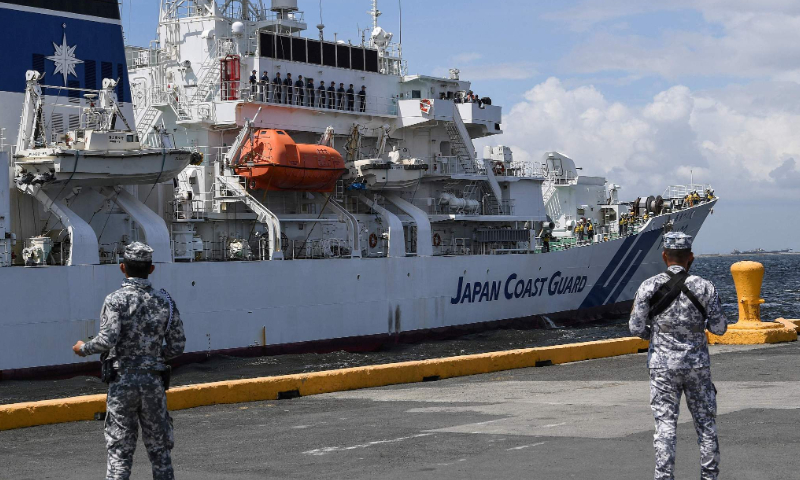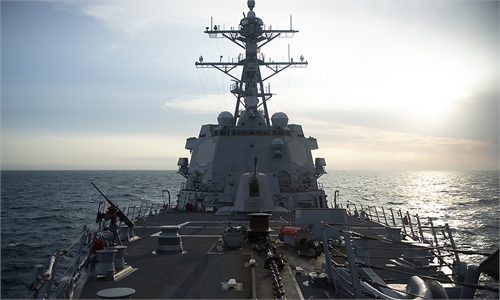Why did Japan publicly name China as a 'hypothetical enemy'?: Global Times editorial

Philippine coast guard personnel stand guard as Japanese coast guard ship Akitsushima arrives at the international port in Manila on June 1, 2023, ahead of a joint maritime exercise with the Philippines and the US. Photo: VCG
The Japanese Self-Defense Forces and the US military are currently conducting an eight-day-long joint command post computer-simulated exercise codenamed "Keen Edge." Despite Japan's earlier claims that the exercise "does not suppose any specific area or country," the Japanese news agency Kyodo News, citing "government sources," reported on January 4 that China is named as a hypothetical enemy for the first time in the exercise, with a presumed scenario of military conflict across the Taiwan Straits. This marks a significant escalation from Japan's provocative statements, stating "a Taiwan emergency is a Japanese emergency, and therefore an emergency for the Japan-US alliance," to actual joint actions by Japan and the US, which is very serious.
This incident also reveals the hypocrisy of Japan. It was reported that, in order to avoid "troubles," the Japanese Ministry of Defense has classified the details of the exercise as "specifically confidential." Previously, temporary names and maps slightly different from real maps were generally used for exercises. However, if they intended to keep it confidential, why did "multiple Japanese government officials" leak information to the media at the same time? It is hard to believe this was not intentionally orchestrated by the Japanese side. The question is, why is Japan simultaneously playing a game of pretending to be transparent and attempting to conceal the truth? What message does Japan really want to convey? Can't Japan be more open? It might be better to speak frankly and openly about the matter.
The assertion that "a Taiwan emergency is a Japanese emergency" is strongly opposed by China, a stance that China has reiterated on multiple occasions. Japan had previously occupied Taiwan for half a century, committing numerous egregious crimes. Japan's current impulses of militarily interfering in the Taiwan question will inflict severe secondary harm on Taiwan. This also disrespects China's sovereignty over Taiwan island and violates the principle of "not interfering in each other's internal affairs" stipulated in the Treaty of Peace and Friendship Between China and Japan. Japan either did not give sufficient attention to China's stern warnings or, under the instigation of the US, made a misguided assessment of the situation, recklessly pursuing adventures and provocations in the Taiwan question. Japan's affront to "the core of China's core interests" has evolved from rhetoric to action, and China's prepared countermeasures will likewise transition from rhetoric to action, ensuring that Japan will face serious consequences if it intervenes.
While Japanese media claimed this is the first time China has been named a "hypothetical enemy" in joint US-Japan military exercises, it is evident that this is not the first time; at most, it is the first time Japan publicly acknowledges it. In June of last year, Japan, the US, and the Philippines held their first trilateral security talks, which was widely seen by Japanese media, including Kyodo News, as a preparation for dealing with a "Taiwan emergency." From November 10 to 20 of the same year, the Japanese Self-Defense Forces conducted the largest-ever joint exercise for the year of 2023. This exercise, for the first time, extensively utilized civilian airports, ports, and other facilities, with the outside world perceiving it as "a response to China." Kyodo News, in its coverage of "Keen Edge," admitted that the US and Japan have multiple joint operation plans envisioning emergencies, with a draft plan regarding Taiwan completed at the end of last year.
Why does Japan, which has always seemingly been relatively cautious, now break from its past practice? One speculation is that Japan and the US may want to exert more pressure on China in this way to achieve a deterrent effect. To put it bluntly, it wants to inform the target of deterrence, which is China, that Japan and the US are actually engaged in military intervention preparations so that China "dare not act rashly on the Taiwan question." If Japan and the US really think so, then they have overestimated themselves and underestimated China's will and ability on the issue of national reunification. This mistake will bring unacceptable risks to Japan and the US.
Tokyo chose to take this action at this time, which was a show, and also exposed its strong sense of crisis. As we all know, including the three documents on national security released at the end of 2022, the path that the Japanese government is currently taking to expand its military, prepare for war and deter China is based on hyping the "China threat" and "war risks." In Japan, support for the Kishida government is dwindling, and there is growing public opposition to increase the country's military spending. Tokyo must spice up its "war risks" narrative so that this strategy can be sustained.
In any case, Japan and the US are indeed training for military intervention in the Taiwan question. This not only undermines the peaceful atmosphere and exaggerates the risk of war, but also substantially increases tensions in the Taiwan Straits. The Taiwan question is China's internal affair, and the method by which China achieves reunification is China's own business. Both Japan and the US have serious political commitments to China on the Taiwan question, and keeping their commitments is their only correct choice. The initiative to realize national reunification is always in China's hands.

